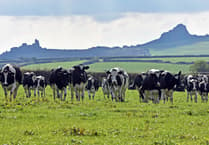The Farmers’ Union of Wales has repeated its call for the importance of food production and farming families to the Welsh economy, culture, communities and landscapes to be recognised.
The union has also urged the Environment, Trade and Rural Affairs Committee to ensure that support, which underpins safe, quality food production, will be maintained in order to avoid irreparable damage to Wales.
Responding to the ETRA Inquiry into the Agriculture (Wales) Bill, the FUW stressed that the previous lack of focus on food production in the 2018 Brexit and Our Land consultation was of significant concern to the FUW’s membership and, since the Brexit referendum, the FUW has consistently argued for Sustainable Land Management principles to include not only the economic sustainability of our family farms but also the sustainable production of safe traceable food.
The FUW therefore welcomed the inclusion of food production in the SLM Objectives contained in the Bill, but remains concerned that a direct reference to the economic well-being of farming businesses continues to be excluded.
The union also expressed concern that the SLM Objectives contained within the Bill were developed from the definition of SLM mooted by the United Nations.
The FUW described this as a narrow definition, which classifies SLM as ‘the use of land resources, including soils, water, animals and plants, for the production of goods to meet changing human needs, while simultaneously ensuring the long-term potential of these resources and the maintenance of their environmental benefits’.
“The plan to focus future support schemes and policy direction on one definition of Sustainable Land Management has not changed since the rhetoric surrounding Sustainable Farming and our Land,” said FUW president Glyn Roberts.
“Although not defined within the Bill, the definition of SLM is contained within the explanatory memorandum and the FUW does not believe that the present SLM definition addresses or recognises the wider context farming both operates in, and contributes to.”
Mr Roberts added that other, broader definitions of SLM exist which are more comprehensive and which recognise the interconnectivity and interdependency of land management and livelihoods.
“For example, definitions, such as that outlined by the World Bank, recognise the need to integrate land, water, biodiversity and the environment with rising food and fibre demands whilst, crucially, sustaining livelihoods. As such, the United Nations’ SLM definition is too narrow,” he said.
Mr Roberts added: “Where the economic viability of farming families is not included within the Objectives of the SLM then farming families in Wales will be vulnerable to future changes in policy which operate under the same SLM framework but which have no obligation to look after their financial well-being.”





Comments
This article has no comments yet. Be the first to leave a comment.